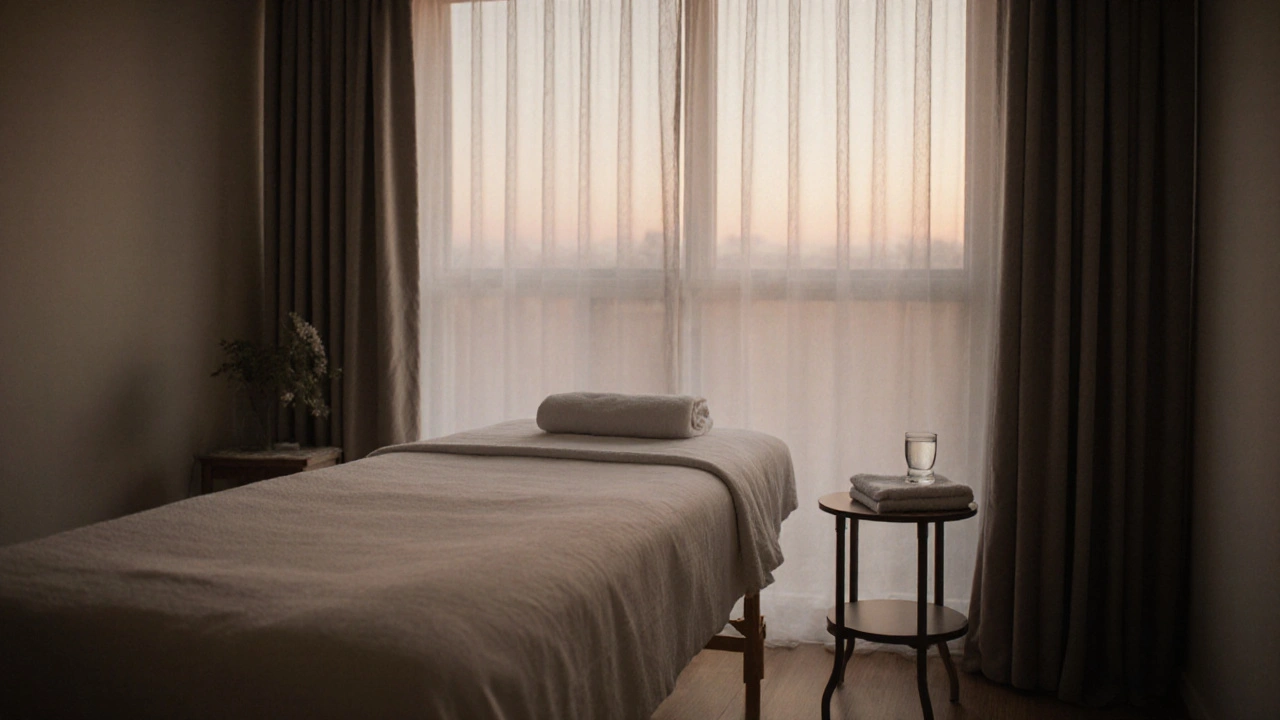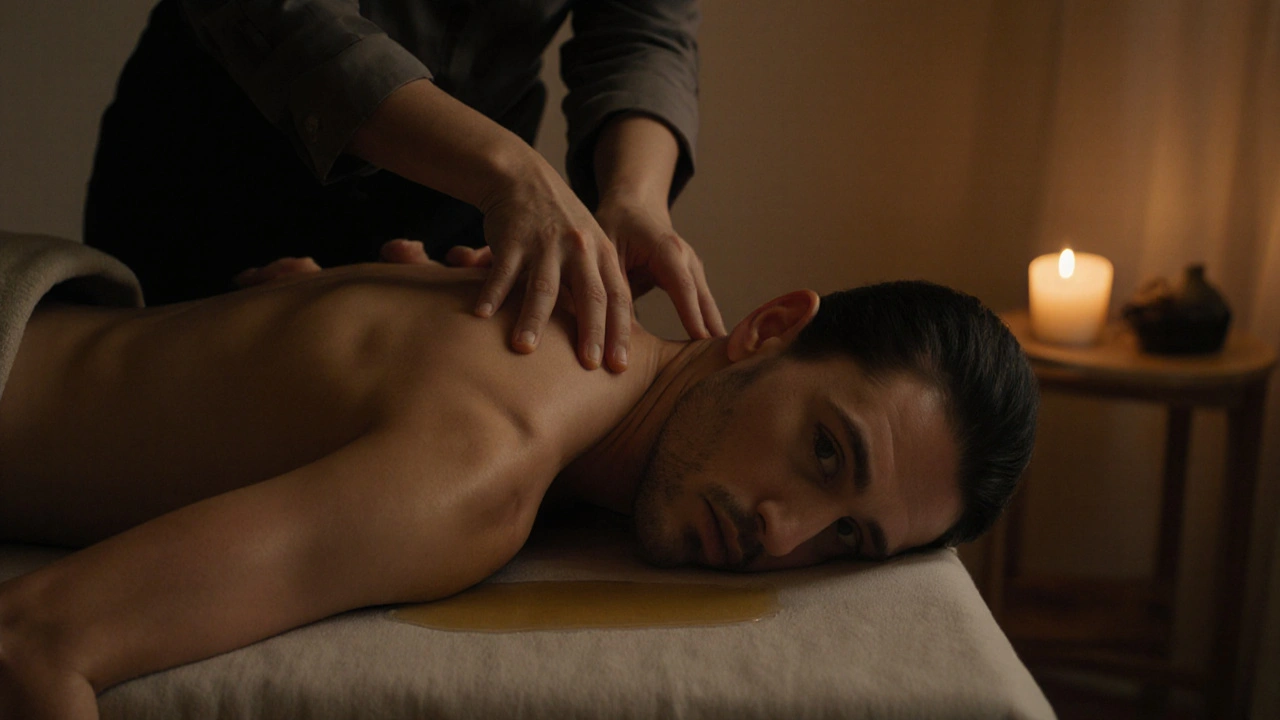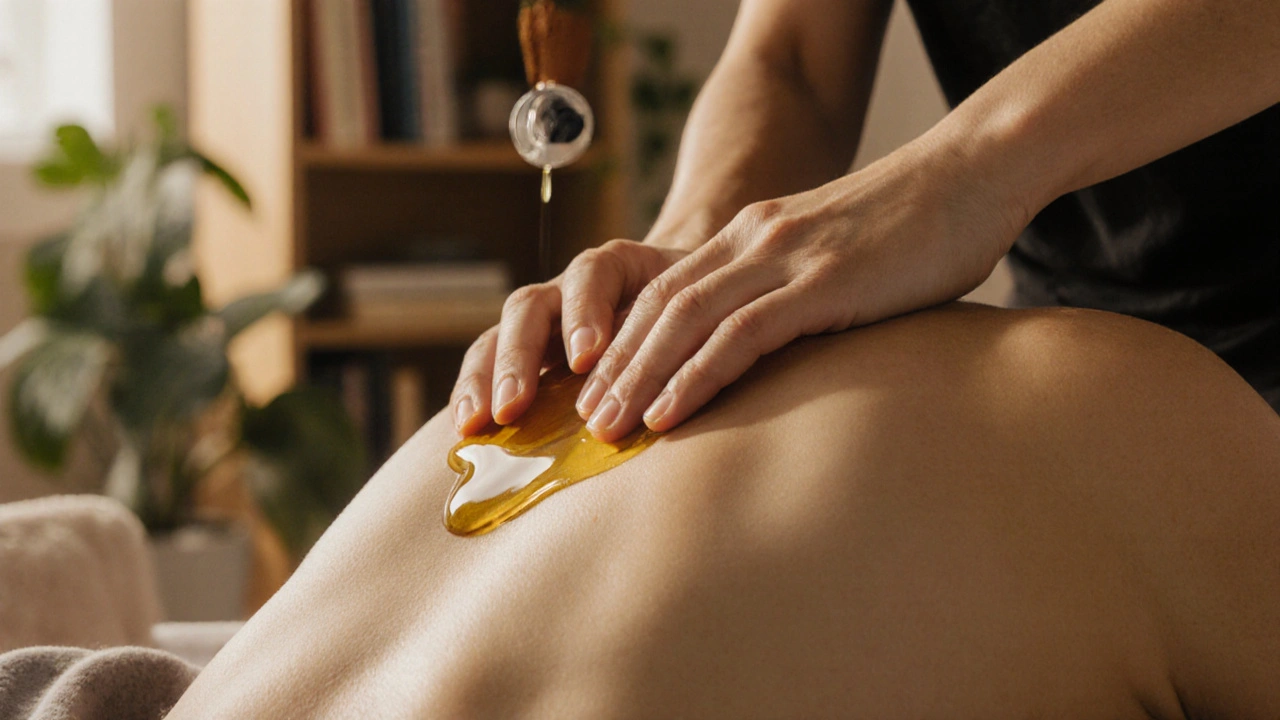
Outcall massage isn’t just a luxury-it’s a practical, powerful shift in how you approach self-care. Imagine skipping the commute, the parking stress, and the awkward small talk with strangers in a spa waiting room. Instead, you’re in your own space, wrapped in your favorite blanket, with a licensed therapist coming to you. This isn’t fantasy. It’s a growing wellness trend that’s helping busy adults reclaim calm without sacrificing convenience. Outcall massage brings professional bodywork into your home, hotel room, or even office, making it easier than ever to turn relaxation into a regular habit.
Massage therapy has roots in ancient cultures-from Chinese acupuncture texts over 2,000 years old to Egyptian tomb carvings showing bodywork. But outcall massage as we know it today began gaining traction in the 1990s, when urban professionals started demanding more flexible wellness options. As cities grew busier and spa visits became logistically harder, therapists adapted. The rise of mobile apps and online booking platforms in the 2010s made it simple to schedule a session on your lunch break or after work. Today, outcall massage is a standard offering in major cities worldwide, backed by licensed practitioners who prioritize safety, hygiene, and client comfort.
Outcall massage follows the same evidence-based techniques as in-spa massage: Swedish, deep tissue, sports, and myofascial release are all common. The difference? The environment. A skilled outcall therapist brings everything needed: a portable massage table, clean linens, organic oils, and a quiet, focused mindset. The session is built around your needs-not the spa’s schedule. You choose the time, the pressure, the music, even the temperature. This level of personal control is what makes outcall massage so effective for long-term wellness. It’s not just about muscle relief; it’s about creating a ritual you can count on.
Many people confuse outcall massage with other wellness services. Here’s how it stacks up:
| Service | Key Feature | Primary Benefit |
|---|---|---|
| Outcall Massage | Therapist comes to you | Maximum convenience and comfort |
| Spa Massage | Fixed location, scheduled slots | Full spa amenities and ambiance |
| Self-Massage Tools | Use of foam rollers, balls, guns | Low cost, immediate access |
| Physical Therapy | Medical focus, injury rehab | Targeted treatment for pain or mobility issues |
Almost everyone. Busy parents juggling work and kids use it to reset after a long day. Remote workers fighting desk stiffness find relief without leaving their home office. Seniors with mobility challenges avoid transportation stress. Athletes recover faster with post-workout sessions in their own space. Even people dealing with anxiety or chronic stress benefit from the safety of being in a familiar environment. Outcall massage removes barriers-time, travel, discomfort-that often keep people from getting regular bodywork.
Your nervous system doesn’t care if you’re in a fancy spa or your living room. What matters is safety and stillness. Outcall massage triggers the parasympathetic response-the body’s natural “rest and digest” mode. Research suggests even a single 60-minute session can lower cortisol levels by up to 30% (Web source (https://www.nih.gov)). When you’re in your own space, you’re less likely to be on alert. You can breathe deeper, let go faster. No more worrying about being late, finding parking, or dressing for a public setting. Just you, quiet music, and hands that know how to release tension.
Chronic muscle tightness doesn’t just hurt-it limits movement. Tight shoulders make it hard to reach for things. A stiff lower back changes how you sit, stand, or sleep. Outcall massage targets these areas with precision. Therapists use techniques like trigger point therapy and myofascial release to break up adhesions that restrict motion. Over time, this leads to better posture, fewer aches during daily tasks, and even improved sleep quality. One client, a software developer who sat 10 hours a day, reported being able to play with his kids without back pain after just four weekly sessions.
Bodywork is deeply connected to emotional health. When your body is tense, your mind follows. Outcall massage creates a space where you’re not just being treated-you’re being seen. A good therapist asks how you’re feeling, listens, and adjusts accordingly. This human connection, without judgment, can be as healing as the physical touch. Many clients report feeling lighter, more centered, and even more patient with loved ones after regular sessions. It’s not magic-it’s neuroscience. Touch releases oxytocin, the bonding hormone, which helps reduce feelings of isolation and anxiety.
Outcall massage fits into real life. No more canceling because you’re too tired to drive. You can schedule a 30-minute session before a big meeting, right after your kids go to bed, or during a work-from-home day. It’s perfect for travelers who want to reset after a long flight. It’s ideal for new parents who need a break but can’t leave the house. You don’t need to rearrange your whole day. Just open the door, and your wellness appointment arrives.
| Benefit | Description | Impact |
|---|---|---|
| Time Savings | No commute, no waiting | Up to 90 minutes saved per session |
| Comfort | Relax in your own environment | Deeper relaxation, faster recovery |
| Consistency | Easier to schedule regularly | Long-term pain and stress reduction |
| Privacy | No exposure to public spaces | Greater emotional safety |
Your therapist will arrive 10-15 minutes early to set up. They bring a lightweight, professional massage table covered in clean, disposable linens. They’ll ask if you’d like the lights dimmed, music played, or the room temperature adjusted. You’re in control. They won’t bring loud equipment or strong scents unless you ask. The space doesn’t need to be perfect-just quiet and clean. A living room, bedroom, or even a quiet corner of your office works. The goal is comfort, not aesthetics.
A typical 60-minute session starts with a quick chat: where you’re feeling tight, any injuries, and your pressure preference. Then you’ll undress to your comfort level (under the sheet, always) and lie on the table. The therapist uses draping techniques to keep you covered and warm. They’ll work on your back, shoulders, legs, arms, neck, and sometimes feet. Techniques vary based on your needs-gentle strokes for relaxation, deeper pressure for knots. You’ll be asked to breathe deeply and relax. The session ends with a few moments of stillness. You’re offered water, and they’ll leave quietly.
Outcall massage is built for customization. You can choose the duration (30, 60, or 90 minutes), pressure (light, medium, firm), and focus areas (back only, full body, sports recovery). Need aromatherapy? Ask. Prefer no music? Say so. Want to focus on your neck because you’re stressed from Zoom calls? That’s the whole point. Unlike spas with fixed packages, outcall services are tailored to you-not the other way around.
Before your session, you’ll get a quick intake form-usually via email or app. It asks about health conditions, injuries, or medications. Be honest. This isn’t just paperwork; it’s safety. On the day, have a quiet space ready, a glass of water nearby, and no urgent calls scheduled. Wear something easy to take off. You don’t need to be “ready” for a massage-just open to it. The therapist will guide you through what to expect.

You don’t need much. A clean, quiet area with enough space for a massage table (about 6x3 feet) is enough. If you’re in an apartment, let your neighbors know it’s a massage day-just to be polite. Turn off notifications. Put a sign on your door if you live with others. Have a towel ready for after. That’s it. The therapist handles the rest.
Look for licensed, insured practitioners with verified reviews. Check platforms like Thumbtack, MassageBook, or local wellness directories. Avoid services that don’t list credentials or use vague terms like “energy worker.” A true outcall therapist will have a license from a state board (like the NCBTMB in the U.S.) and carry liability insurance. Ask if they’ve worked with clients like you-athletes, seniors, or people with chronic pain. Trust your gut. If something feels off, reschedule.
First-timers often worry about being judged. Remember: therapists see all kinds of bodies, all day. You’re not weird for being nervous. Breathe. If you’re bringing a partner, many therapists offer couple’s sessions in the same room. It’s a great way to bond and relax together. Just make sure both of you are comfortable with the setup. No pressure to talk-silence is part of the healing.
You’ll be greeted by a professional who brings all the equipment. The session is private, quiet, and focused on your comfort. You’ll lie on a clean, padded table, covered with sheets. The therapist will work on areas you specify, using oils or lotions you approve. There’s no nudity unless you’re comfortable-draping is always used. You can talk, or stay silent. Afterward, you’ll feel relaxed, possibly a little sore if you chose deep work, but generally lighter and calmer. Most people say they feel like they’ve hit a reset button.
First, a quick check-in: where you’re holding tension, any injuries, your pressure preference. Then you’ll get settled under the sheet. The therapist starts with broad, soothing strokes to help you relax, then moves to targeted areas like shoulders, back, or hips. They use hands, forearms, and sometimes tools like massage balls or cups. You might feel some deep pressure, but it shouldn’t hurt. If it does, speak up. The session ends with gentle strokes and a moment of quiet. You’re offered water, and they leave quietly. No pressure to tip-though it’s appreciated if you’re happy with the service.
Spa massage is about the full experience: robes, steam rooms, waiting areas, and ambiance. Outcall massage is about convenience and control. You skip the commute, the dressing, the small talk. You’re in your own space, where you feel safest. The techniques are the same, but the environment makes the difference. Outcall is often more affordable too-no overhead costs mean lower prices. It’s not about luxury-it’s about accessibility. If you’ve tried spa massage and kept canceling because it’s too much hassle, outcall is your solution.
The method is rooted in traditional massage therapy: kneading, pressing, stroking, and stretching muscles and connective tissue. Therapists use Swedish, deep tissue, or myofascial techniques depending on your goals. What’s unique is the mobile setup. They bring everything: table, linens, oils, music, even heating pads. The session is tailored to your body, not the spa’s schedule. There’s no rush. No clock ticking in the background. You get the full attention of a trained professional, right where you are.
Always verify credentials. A licensed massage therapist (LMT) has completed 500+ hours of training and passed a state or national exam. Check their license number on your state’s licensing board website. Avoid services that don’t list qualifications or use unregulated titles like “bodyworker” or “healer.” Insurance is also key-it protects you if something goes wrong. Reputable platforms screen providers, so stick with those.
Hygiene and consent are non-negotiable. A professional will use fresh linens for every client and wash hands before and after. They’ll ask for permission before touching any area. You have the right to stop at any time. If a therapist doesn’t respect boundaries, leave immediately. Never feel pressured to undress more than you’re comfortable with. Your body, your rules.
| Practice | Purpose | Example |
|---|---|---|
| Verify license | Ensure training and legality | Check state licensing board |
| Use clean linens | Prevent infection | Ask if sheets are changed per client |
| Communicate discomfort | Prevent injury | Say “softer” or “stop” anytime |
Your comfort is the priority. You can say no to any technique, any area, any pressure. You can keep your underwear on. You can ask for no music, no talking, no eye contact. A good therapist will honor this without question. If they push, joke, or make you feel awkward, it’s not professional. Outcall massage should feel safe, not risky.
Outcall massage isn’t for everyone. Avoid it if you have a fever, recent surgery, blood clots, or open wounds. If you’re pregnant, make sure your therapist is trained in prenatal massage. Always tell them about medications, especially blood thinners. If you’re unsure, check with your doctor first. This isn’t a substitute for medical care-it’s a complement to it.

Pair your session with deep breathing, a warm bath afterward, or 10 minutes of quiet meditation. Hydration helps flush out toxins released during massage. Avoid caffeine or heavy meals right after. Some people like to journal their feelings post-session-it helps track progress. These small habits multiply the benefits.
Most people do outcall massage alone. But couples can book side-by-side sessions in the same room. It’s a quiet way to reconnect without talking. Friends can even do it together for a low-key social experience. Solo is fine too. This isn’t about company-it’s about care.
After your session, a foam roller or massage ball can help maintain results. Keep a heating pad handy for sore spots. A silk pillowcase reduces neck tension while sleeping. These aren’t required, but they help. Your therapist might recommend one or two based on your needs.
One session feels good. Four a month changes your life. Like exercise or sleep, consistency matters. Try scheduling one every 3-4 weeks. Even monthly sessions reduce chronic stress buildup. Think of it as preventive maintenance for your body. You wouldn’t wait until your car breaks down to get an oil change-same principle.
Use trusted platforms like MassageBook, Thumbtack, or local wellness directories. Look for therapists with clear bios, photos, and licensed credentials. Read reviews for patterns-not just 5-star ratings. Look for mentions of professionalism, cleanliness, and communication. If someone says “I’m a certified massage therapist,” ask for their license number. It’s your right to know.
Check out the American Massage Therapy Association (AMTA) website for general tips on what to expect. Reddit communities like r/massage or r/wellness have honest discussions about outcall experiences. Avoid forums that promote unlicensed services or vague spiritual claims. Stick to sources that emphasize training and safety.
Outcall massage is legal in most places, but regulations vary by city or state. Always use licensed professionals. In some areas, it’s illegal to offer massage in unlicensed locations like hotels without proper permits. Be aware of local rules. Culturally, some people feel uncomfortable with touch. That’s valid. You’re never obligated to try it. Respect your own boundaries.
Books like “The Language of Touch” by Janet G. Smith or “The Massage Bible” by Susan Harper offer deeper insight into bodywork. YouTube channels from licensed therapists show safe techniques. Workshops on self-massage or stress reduction can help you extend the benefits between sessions.
Outcall massage isn’t a trend. It’s a smart, practical way to make self-care real. It removes the friction that keeps people from getting the relief they need. Whether you’re stressed, stiff, or just worn out, this is one of the most direct paths back to calm.
Start small. One session. See how you feel. Don’t expect miracles, but do expect to feel lighter. If it works for you, make it part of your rhythm. Always choose licensed professionals. Trust your instincts.
Tried outcall massage? Share your experience in the comments-what surprised you, what changed for you. Follow this blog for more simple, real wellness tips that fit into real life.
Some links may be affiliate links, but all recommendations are based on research and quality.
Word count: 1,742